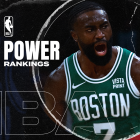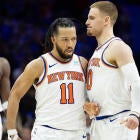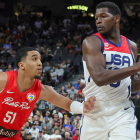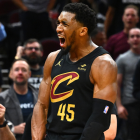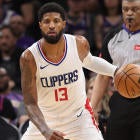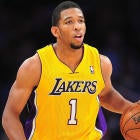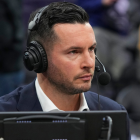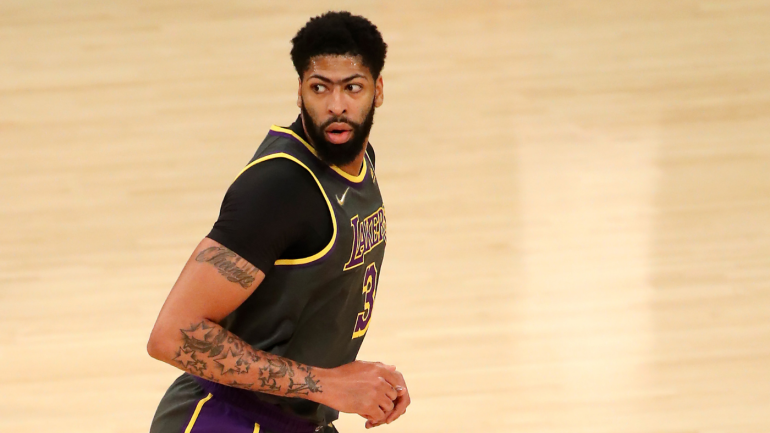
When the Los Angeles Lakers traded for Russell Westbrook, a blockbuster move if only by name, just about everyone's most modern basketball senses started tingling. Shooting. Spacing. The former creates the latter, and the Lakers -- having shipped out Kyle Kuzma and Kentavious Caldwell-Pope, their two most impactful 3-point marksmen -- appeared to be in short supply of both.
They went on to address a least a peripheral part of these concerns, adding Carmelo Anthony, Wayne Ellington, Malik Monk, Trevor Ariza and Kendrick Nunn in free agency. I'm interested to see how many isolations the Lakers allow Anthony, how many plays they run to get Ellington shots, whether Monk's late stretch of excellence last season was indicative of a real corner turn, and how often Westbrook can contain his pull-up urges. But what I'm most interested in is how Frank Vogel, recently signed to a contract extension, deploys his lineups.
Westbrook is quite literally the worst volume 3-point shooter in history -- 30.5 percent for his career, the lowest mark of any player to attempt at least 2,500 triples. Three of the past four seasons he's been sub-30 percent from deep. When Westbrook, LeBron James and Anthony Davis are on the floor together, will Vogel fill the other two spots with shooters to give his three stars at least operational space?
Let's say he puts two of Ellington, Monk, Anthony and/or Talen Horton-Tucker with the big three. That puts Davis at the five, where we know he isn't happy. Let's say Davis gets his preferred big man next to him, either Marc Gasol or Dwight Howard, so he can stay at power forward. That's four shooters the defense will be happy to let fire away. And in both cases, the defense has holes.
To varying degrees, all four of Anthony, Ellington, Monk and Nunn are defensive liabilities, and the Lakers no longer have Caldwell-Pope or Alex Caruso, their two best on-ball defenders from last season. Their point-of-attack defense stands to be pretty soft. Westbrook can make a difference here, if he chooses to commit. But more than likely, the Lakers will be scrambling to cover initial breaches.
Good thing they have Davis.
Between Davis and LeBron, the Lakers have two of the better help defenders in the league. I don't know how realistic it is to expect James -- who will turn 37 before the flip of the calendar -- to co-anchor a defense for 82 games, but he can certainly do it in spurts during the regular season and during the playoffs. Davis, however, should be putting out fires every night.
When he's healthy and focused, Davis can serve as a one-man defense. The Lakers know that, and they're banking on him to cover for the defensively deficient newcomers. The Utah Jazz were the best defense in the league last season, per Cleaning the Glass, and it was almost entirely because of Rudy Gobert. As the theory goes, you don't have to contain so much on the perimeter if you have a windmill behind you.
There are ways to neutralize a rim protector like Davis. Obviously, teams who play small or with a shooting big will pull him away from the basket, but he's so good at splitting the difference between contesting on the perimeter and recovering to the paint that L.A. can get away with what would be an impractical coverage range for virtually any other big man. It's a lot to ask, but Davis can do it. He's going to have to operate at a Defensive Player of the Year level all season.
The Lakers will make things easier on him as much as possible. They brought back the aforementioned Howard, who adds another layer of paint protection and rebounding when he's alongside Davis. Yes, two-big lineups that include Westbrook will lack spacing, but again, Davis makes this feasible with his ability to dominate in tight quarters, and overall the Lakers have proven they can win the big-small battles.
When the Lakers won the title in 2020, they were a bottom-10 team in both 3-point makes (11.0 per game) and percentage (34.9), and those numbers did not significantly change in the postseason. They won by bludgeoning teams with brut size and rim attacks (an approach Westbrook fits), and because Davis shot from the midrange like he was Kevin Durant.
That last element is yet another Davis bailout. When he faces up and simply cooks his man one-on-one or rises up over him, spacing isn't such a problem. LeBron can consistently overpower his man, too. Westbrook can still get into the lane almost at will, and he's a great interior passer as a byproduct of his drives. He'll do more damage with lobs, drop-offs and last-second hitters to flashers than he will on kick-outs to shooters, anyway.

CBS Sports HQ Newsletter
Your Ultimate Guide to Every Day in Sports
We bring sports news that matters to your inbox, to help you stay informed and get a winning edge.
Thanks for signing up!
Keep an eye on your inbox.
Sorry!
There was an error processing your subscription.
Davis makes it easier to imagine an optimized Westbrook, who has never enjoyed a pick-and-roll partner with this kind of size and athleticism. The Lakers went in the tank with LeBron off the floor last season, but this year Westbrook and Davis can play with three shooters (which, again, is feasible because of Davis' ability to cover the cracks) and put ridiculous downhill pressure on the defense.
The Lakers are still LeBron's team, but this is Davis' season. If the Lakers didn't have him, the addition of Westbrook combined with the defensive subtractions of Caruso and KCP would feel like much tougher, if not impossible, challenges to overcome. Davis allows L.A. to reap the rewards of Westbrook's shot creation and the added shooting of Ellington, Monk and Anthony without losing the net war.
Given this extreme two-way responsibility, and assuming the numbers he's put up his entire career when healthy, Davis has a shot to be right in the thick of the MVP race. In fact, the Lakers might not be able to withstand much less than that.














